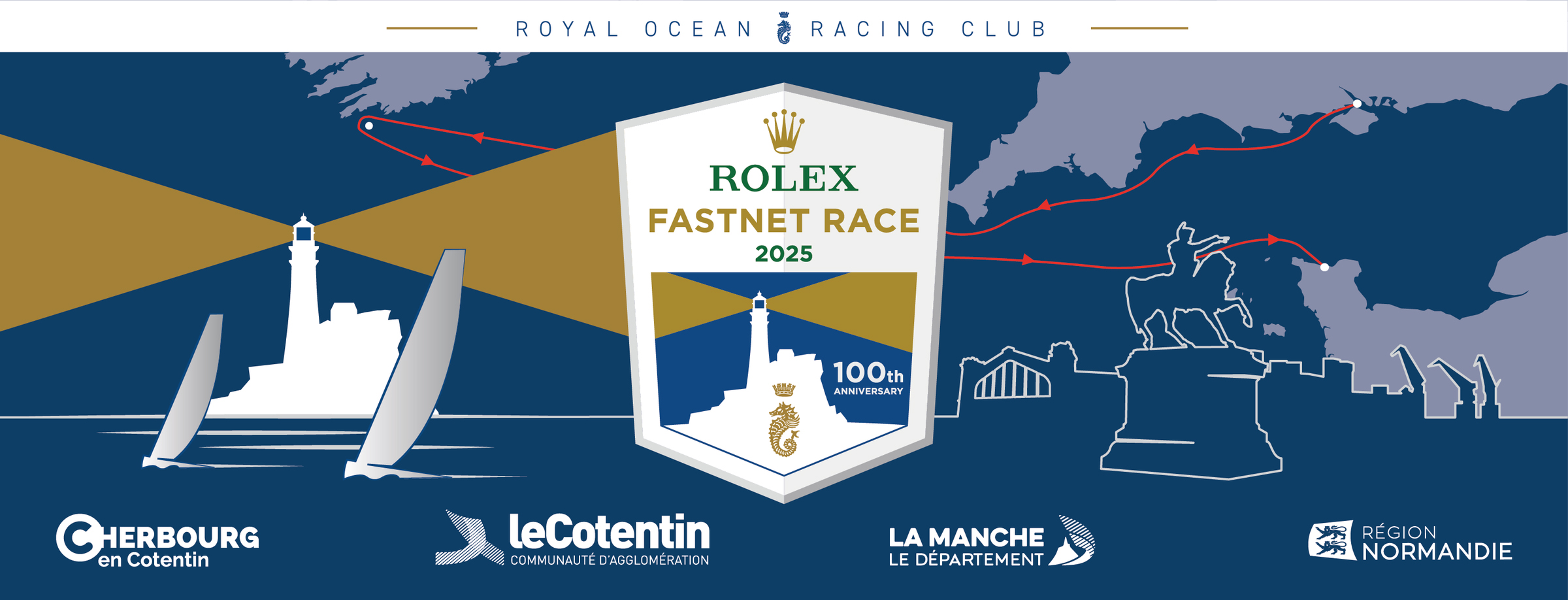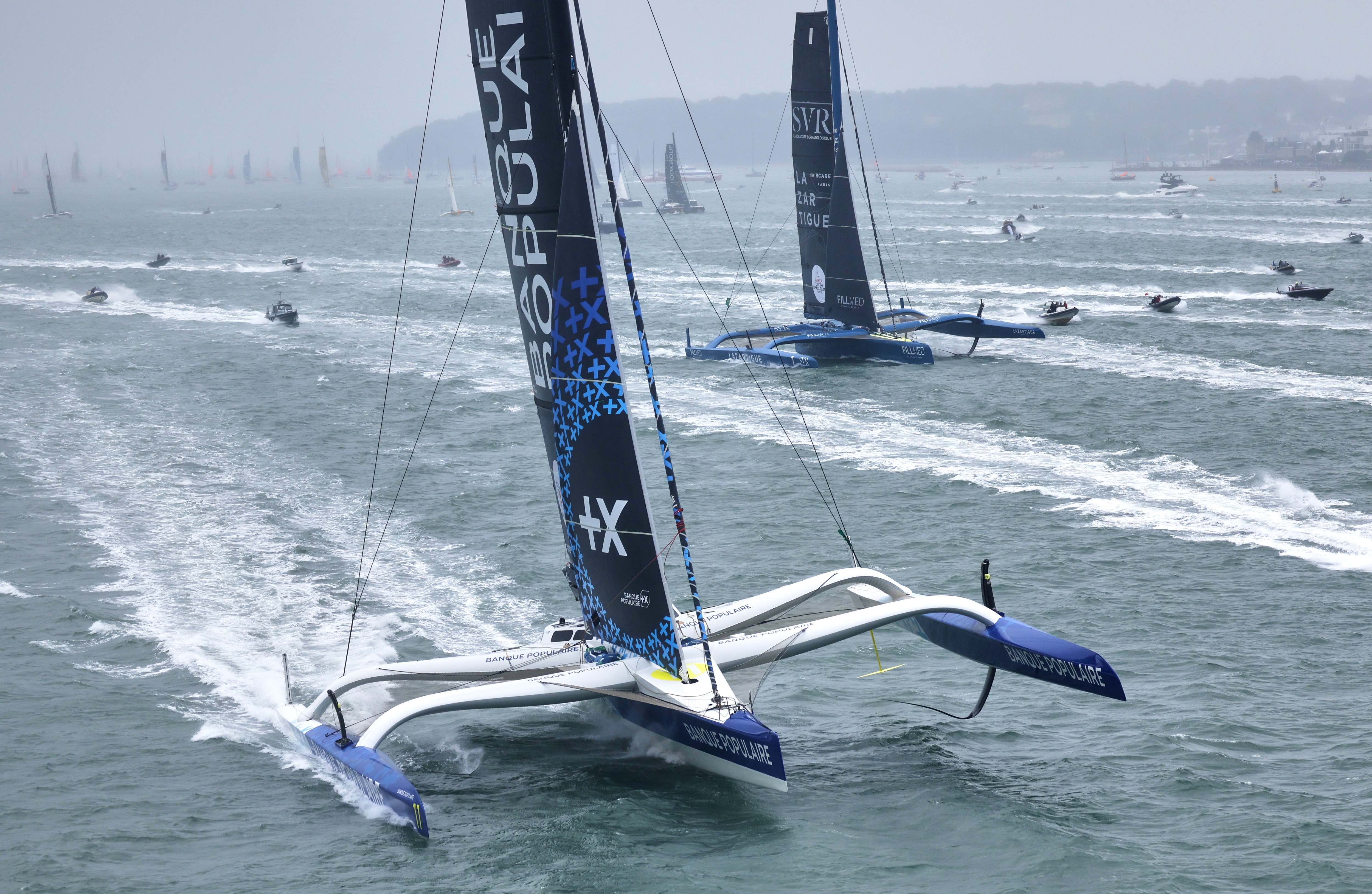

This afternoon the Solent shoreline was packed deep with spectators braving the conditions to witness the greatest assortment of offshore yacht racing hardware ever assembled. The special 50th edition of the Royal Ocean Racing Club’s Rolex Fastnet Race set sail with 430 yachts - up from the previous record of 388 that took the last pre-COVID race in 2019.
While pundits were comparing the wind this afternoon to that of the last Rolex Fastnet Race in 2021, in fact it was gustier and conditions were otherwise quite different with a densely overcast sky, drizzle that built to rain, and enough mist to obscure the mainland. What was consistent was the heinous washing machine seastate that competitors encountered at the western exit of the Solent at Hurst Narrows, as they passed the Isle of Wight’s most famous landmark, the Needles and beyond. As usual this built increasingly with the ebb tide, especially affecting the smaller yachts.
Mercifully the measures that the RORC introduced this year to help minimise the risk of collisions, including course marshalls and increasing the time between starts to 15 minutes, there were no pre-race collisions as there were two years ago. Another rule was introduced this year to dissuade boats from being over early – those OCS 30 seconds out from the line would incur a mandatory two hour penalty instead of having to turn back into the next group of starters to recross the line. This caught out a few boats, including a significant number in the third start for the Class 40s, when the tide was properly beginning to ebb off around the Royal Yacht Squadron line.
As usual the two 32m long Ultim trimarans, Banque Populaire XI and SVR Lazartigue and Erik Maris’ MOD70 Zoulou, plus the lead flying IMOCAs created the most dramatic spectacle as, with sheets slightly cracked, they literally flew upwind in the brisk conditions.
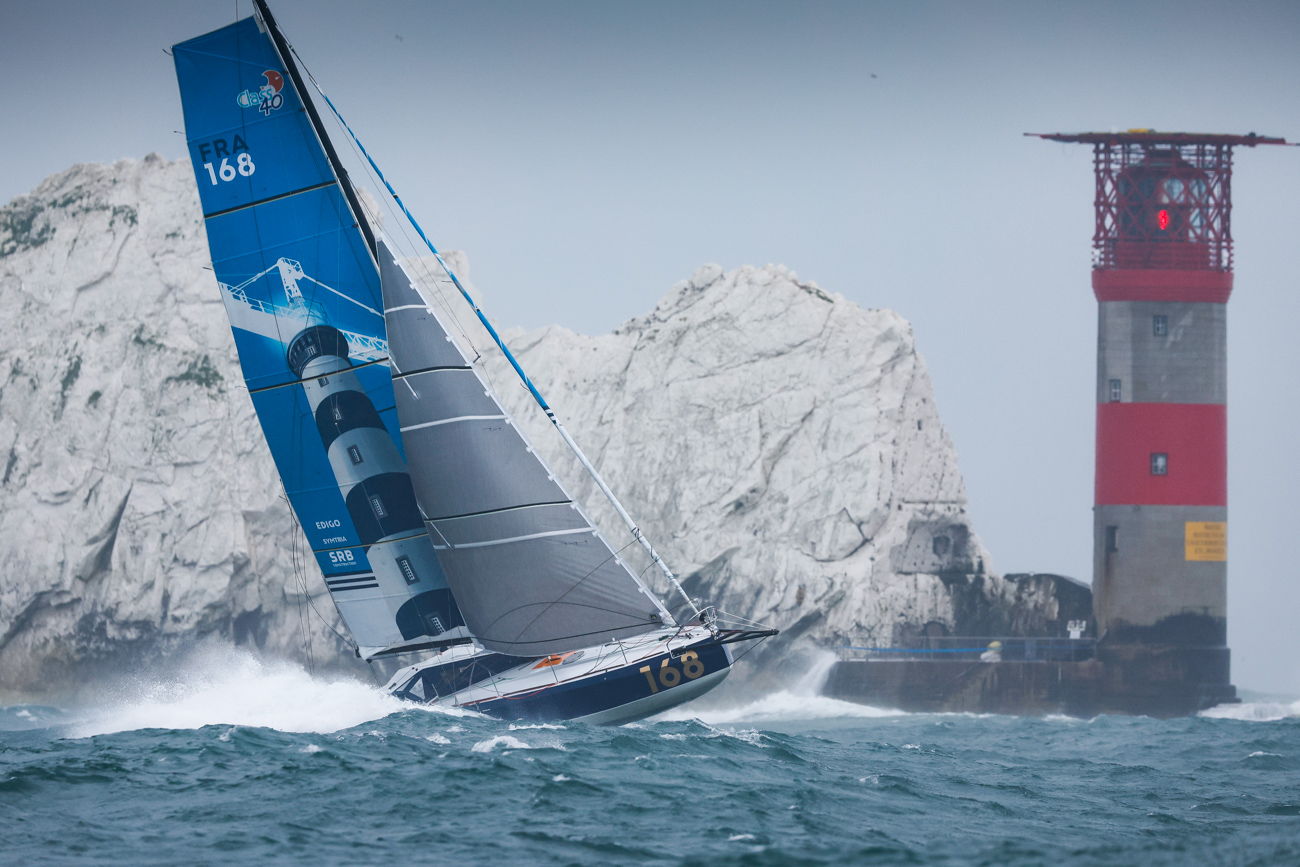 The Class40 THE3BROS of Renaud Courbon © Paul Wyeth
The Class40 THE3BROS of Renaud Courbon © Paul Wyeth
Prior to the start Charlie Dalin, the outright Rolex Fastnet Race IMOCA class winner in 2021, back now with his brand new boat MACIF, commented: “We are really pleased to be here after just four days of sailing. The team did an amazing job to get the boat ready in such a short period of time. Obviously the boat is not up to its potential, but that is why we are here - to keep working and testing.
“It will be a pretty windy course, especially the first eight to 10 hours. The wind should ease fairly rapidly after Start Point but until then it will pretty full on. There will be a lot of manoeuvres and sail changes, even on the way back from the Fastnet. We will have less breeze just before we reach the Irish coast for a while and perhaps once we get back into the Channel, from Land End’s to Cherbourg, but the forecasts are a bit different now. It is going to be an intense race.”
Despite this, by the time MACIF exited the Solent she was leading the IMOCA class alongside Jérémie Beyou’s Charal, while British hopes Pip Hare and Nick Bubb on the former’s Medallia (also newly relaunched) had to return to the Solent briefly to fix a problem with her furler. This year the IMOCA fleet split between going south or following Dalin on via the North Channel. At 1800 this evening MACIF was leading the IMOCAs past Portland Bill with Britain’s Sam Davies on board Initiatives Coeurs holding third in the 29 boat fleet.
Meanwhile in Ultims, Banque Populaire disappeared off to the Cotentin Peninsula which she reached in just five hours and tacked, preparing to pass to the south of the Casquet TSS exclusion zone as SVR Lazartigue was lining up to stay north of it.
In the IRC fleet, the highest rated yacht, American Bryon Ehrhart’s Lucky (ex-line honours winner Rambler 88) had done well in the Solent and, despite starting some 30 minutes behind, was already half way up the IMOCA fleet as she prepared to tackle Hurst Narrows. At 1800 she was alongside the lead IMOCA but sailing a knot slower.
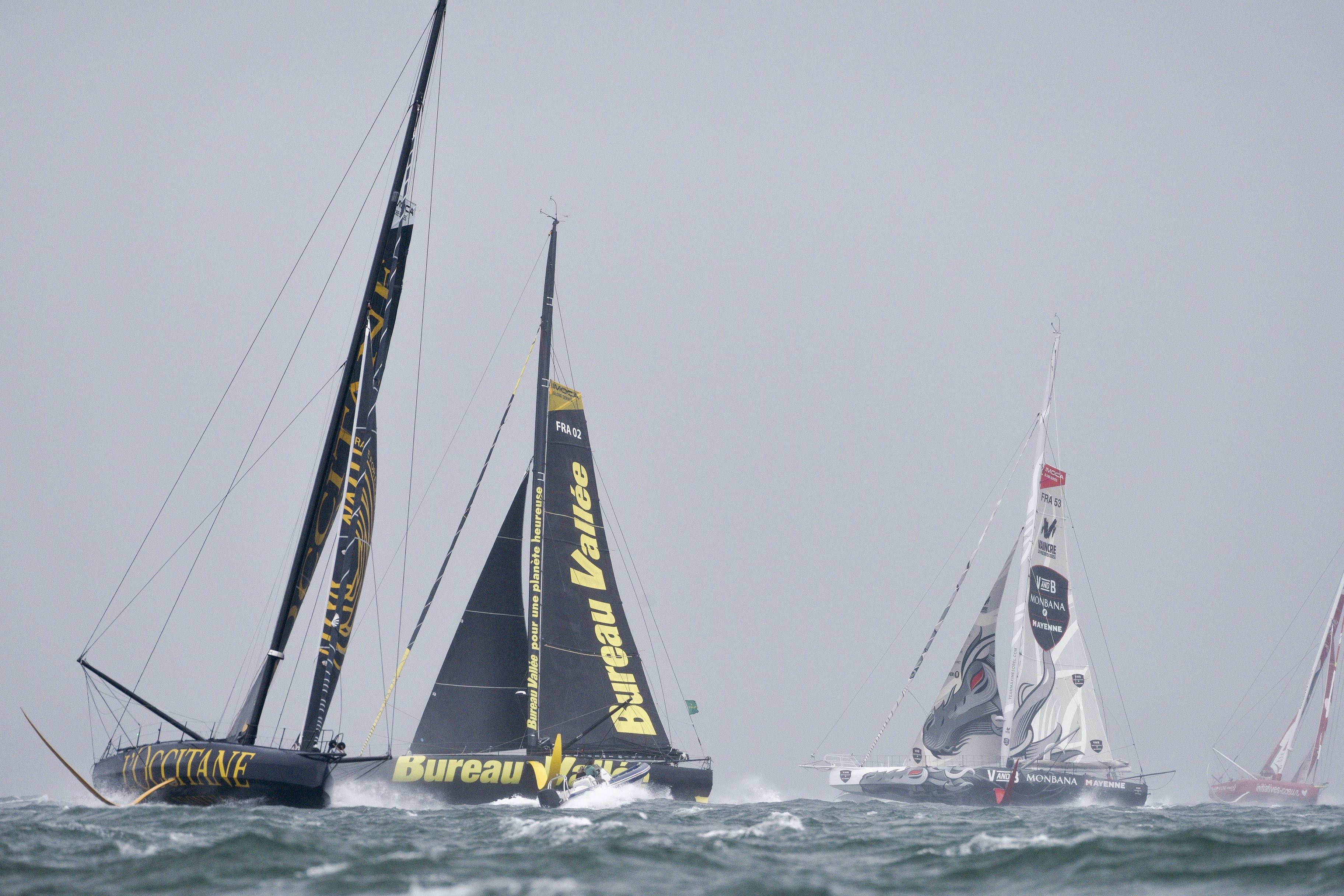 The lead IMOCAs were able to fly upwind in the Solent © Rick Tomlinson
The lead IMOCAs were able to fly upwind in the Solent © Rick Tomlinson
Currently two Italian teams are leading the annual Class40 Championship and one, Ambrogio Beccaria's Alla Grande Pirelli, had already pulled out a substantial lead by the time the 22 Class40s exited the Solent. Like the IMOCAs there was an equal divide between the Class40s leaving the Shingles Bank to port or to starboard, with Alla Grande Pirelli heading south before tacking west. At 1800 she had just passed St Alban’s Head.
The other Italian Class 40, Alberto Bona’s Mach 40.5 IBSA was in eighth. IBSA recently won the class’ Les Sables-Horta-Les Sables Race in which she managed to set a phenomenal Class40 24 hour record of 430 miles, sailing downwind in 25-30 knots. Bona, who sailed the last Rolex Fastnet Race as navigator on board the former line honours winner Stormvogel, said before the start:
“For us the conditions are not good. We will be in a very difficult position - the first 16-18 hours will be more survival than sailing because we are really flat with a lot of volume in the bow, so going upwind in a strong and choppy sea (wind against tide), is not our favourite condition. But the boat is great so we are aiming to survive the first 24 hours and then we can switch to race mode. There are many other competitive Class40s - it will be a tough battle for everyone.”
This evening IRC Zero was being led on the water by a Botin Partners trio of designs as they approached Portland Bill: with Jean-Pierre Barjon's the 65ft Spirit of Lorina ahead of Stefan Jentzsch's 56 Black Pearl and Max Klink's 52 Caro, the leader under IRC corrected time.
Meanwhile IRC One was up with the Class40s, the leaders just passing St Alban’s Head. Making up for the start line collision last year that had put them out of that race, the Fournier family's J/133 Pintia was leading IRC One both on the water and under IRC corrected time. Under IRC she was ahead of Dr Herve Benic's First 40 Iritis and Ed Bell's JPK 1080 Dawn Treader (the other party involved in Pintia’s 2021 collision). These three were all closest to St Alban's Point with the Rolex Fastnet Race's defending champion, Tom Kneen's JPK 1180 Sunrise to their southwest, alongside another previous class winner, French veteran Jacques Pelletier's Milon 41 L'Ange de Milon. Several contenders including Andrew and Sam Hall's Lombard 46 Pata Negra had tacked off south, mid-Channel.
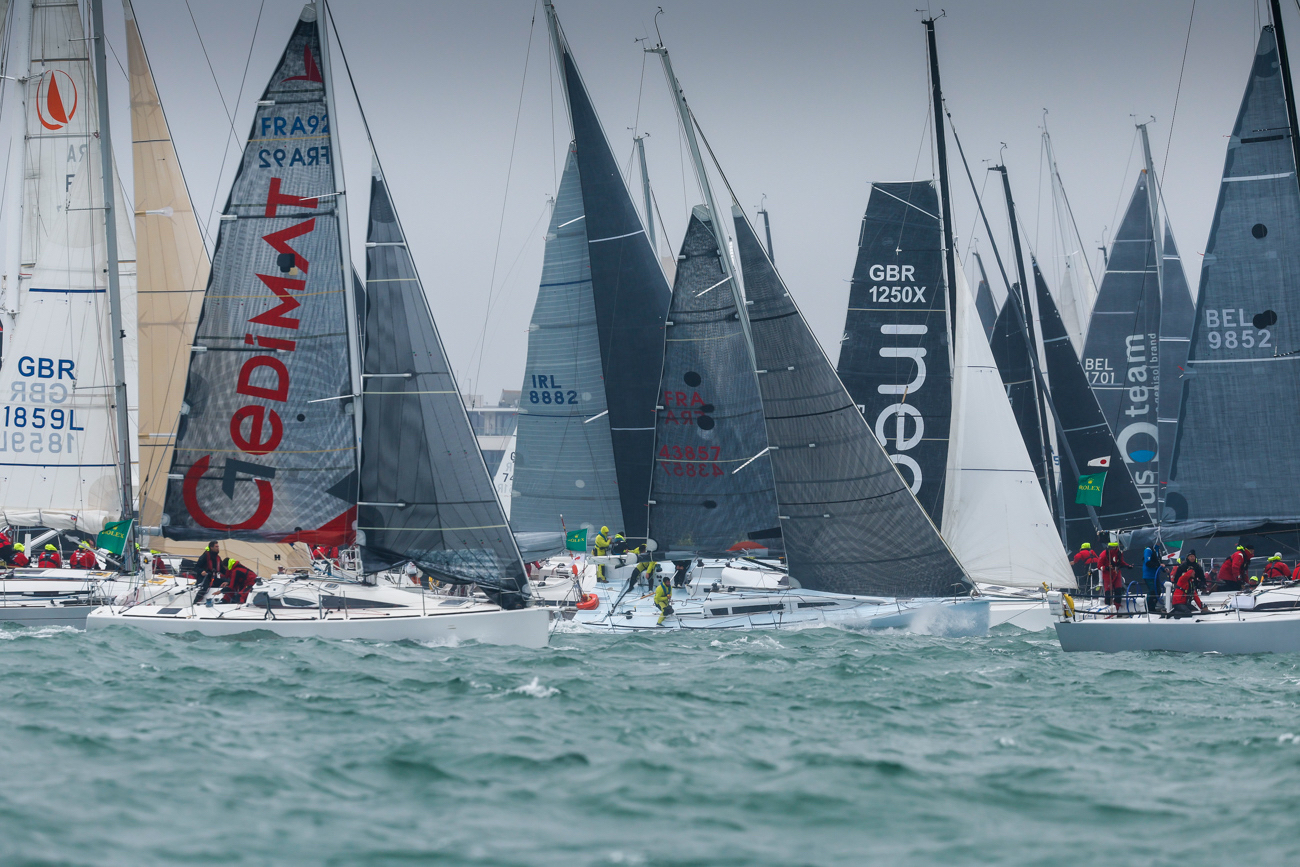 IRC One sets sail. © Paul Wyeth
IRC One sets sail. © Paul Wyeth
Prior to the start Will Taylor-Jones commented: “It could be our weather. It could be worse, but it could also be quite brutal. We have a relatively young crew that has only sailed the boat for a couple of seasons and we haven’t actually had this type of weather for any length of time, so it will be a challenge for us.”
As to the weather Taylor-Jones was expecting to encounter holes in the breeze crossing the Celtic Sea, but stronger windfor the way home. “But I think as ever the race will be won or lost on the way out. But there is a lot of windward work so we can’t complain because Sunstone is good in that. The boat will look after us. We are mindful she is an old lady now but I think she might still be stronger than the crew!”
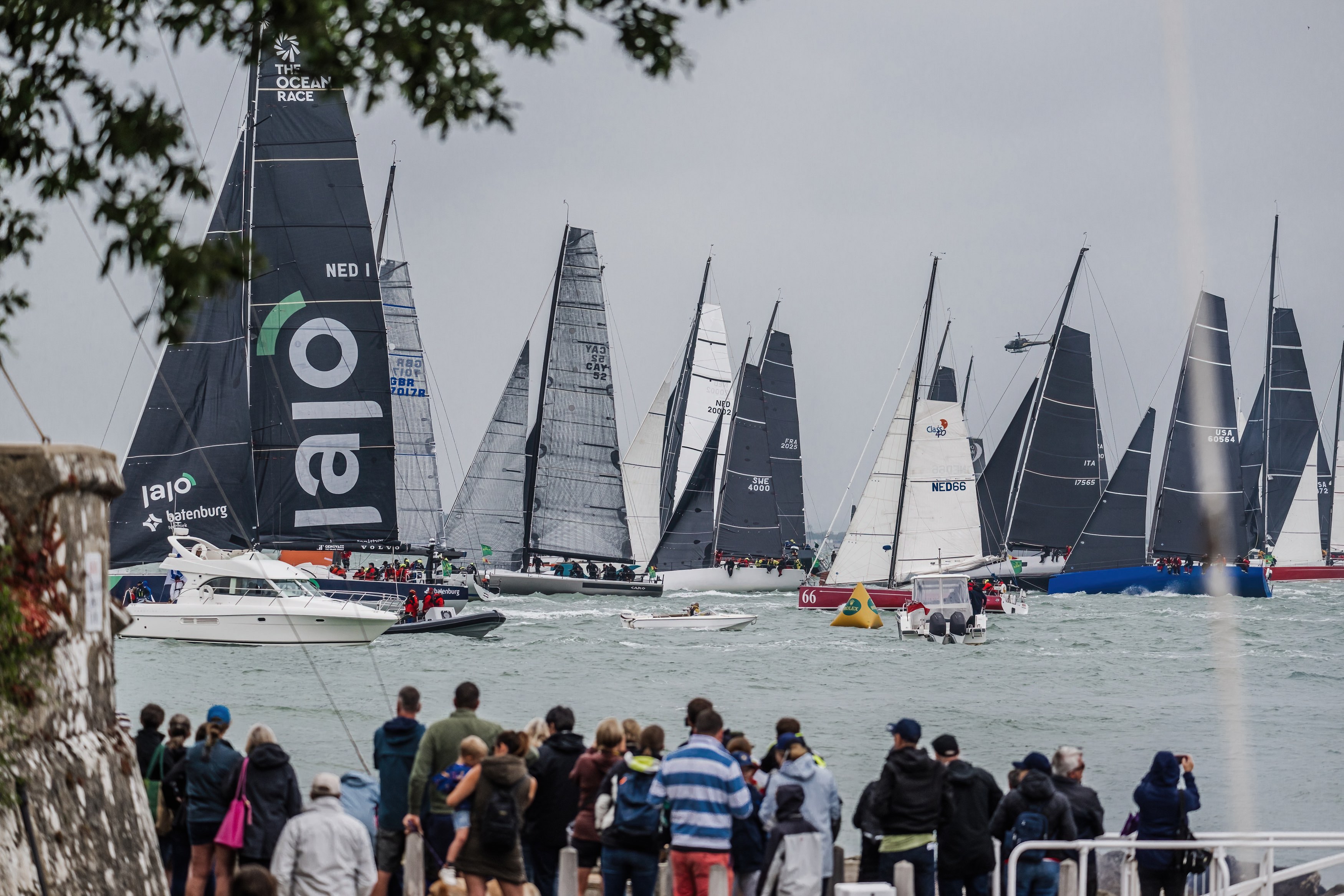 IRC Super Zero and Zero set off from the Squadron line. © Paul Wyeth
IRC Super Zero and Zero set off from the Squadron line. © Paul Wyeth
Meanwhile the biggest class in the fleet, IRC Two-Handed, is being led by Archambault 40RC Vita of Martin Hingst, racing in IRC One.
The conditions have taken their toll on the fleet with a number of retirements or boats that are moored waiting for tonight’s big conditions to pass. These include past winner and race veteran Gery Trentesaux’s Sydney 43 Long Courrier with mast issues. Meanwhile from a mooring off Cowes, the oldest boat in the race, the magnificent 1903 Fife Moonbeam, skipper, round the world racer Jacques Caraes reported “we shall be racing again early tomorrow morning. We didn’t want to break the pretty old ship Moonbeam.”
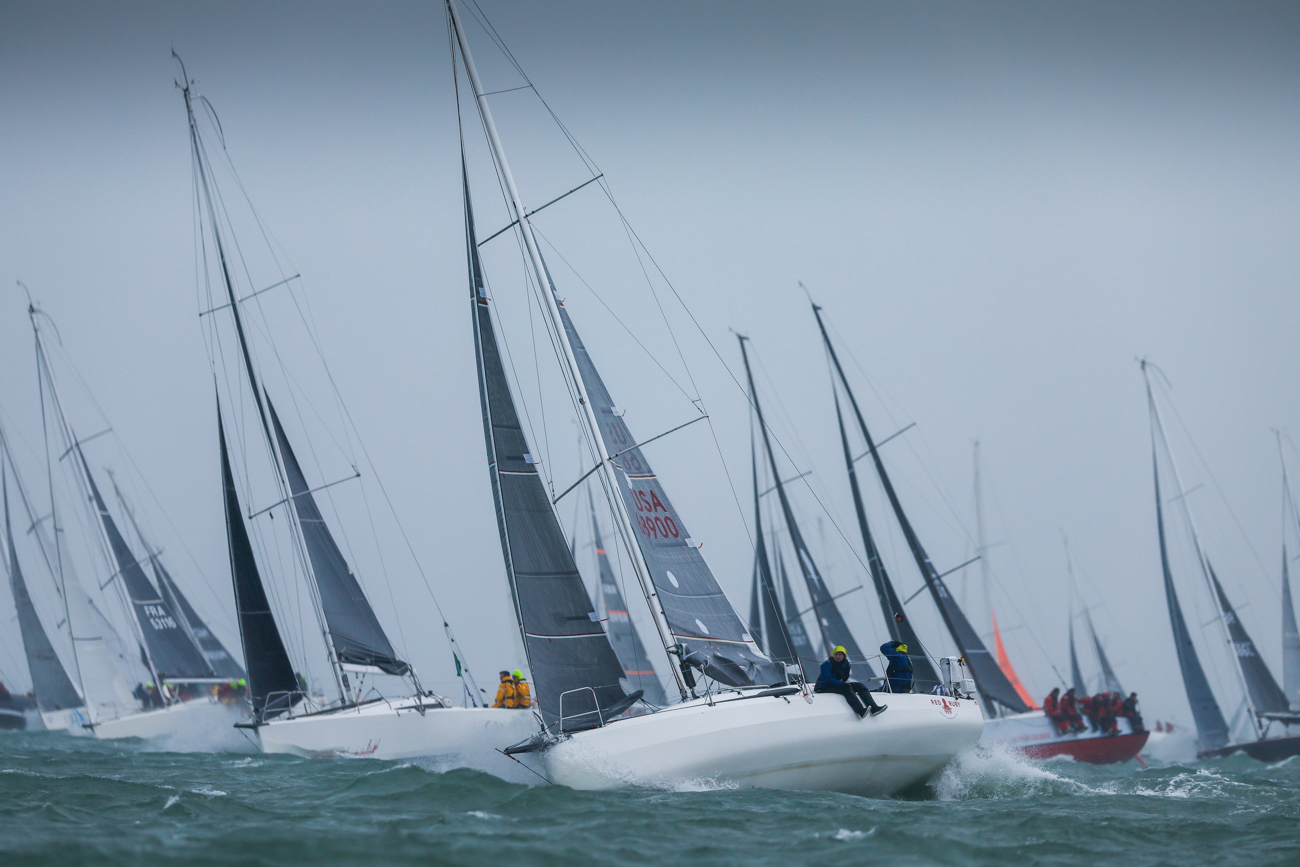 Chris and Justin Wolfe's Red Ruby mid-fleet at the start of IRC Two. © Paul Wyeth
Chris and Justin Wolfe's Red Ruby mid-fleet at the start of IRC Two. © Paul Wyeth
